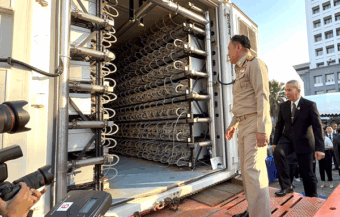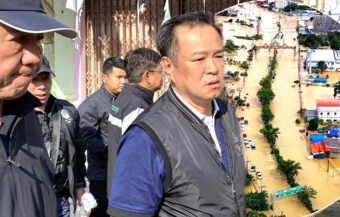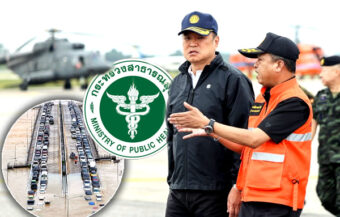Figures published this week show a strong financial system but a deeply dysfunctional economy plagued by growing inequality. Thailand’s economic problems date back to well before this pandemic which has only served to expose them. The World Bank and other international financial institutions have long urged the government to introduce more radical plans to tackle inequality at all levels to afford younger generations a level playing field of opportunity which certainly does not exist now.
As Thailand reduced its bank deposit protection limit this week, economic analysts have emphasised the strength of the banking system in the country underpinned by record-high levels of deposits with funds held by foreign residents amounting to ฿596,779 billion while the wealthiest Thais, in the top 1.6% of commercial bank account holders, held funds valued at over ฿11.411 trillion. The figures reflect rising inequality and poverty in the kingdom whose economy increasingly isolates over 90% of its population from the ranks of the well off, a situation that is unsustainable if the country seeks to progress and emerge from an extended economic malaise going back well before the pandemic.

As protests roam the streets of Bangkok clashing with police on Wednesday in what are now daily clashes, news emerged on the nature of bank deposits in Thailand which serve to highlight the growing inequality in the kingdom.
The data came 48 hours before Thailand’s adjusted lower level of bank deposit protection kicked in and appears to show that only 1.52% of all funds added to accounts in Thailand’s commercial banks last year came from 91.22% of account holders.
The total value of their holdings was ฿1.128 trillion while foreign residents in the kingdom held 3.52% of all wider bank financial holdings, according to the Bank of Thailand, valued at ฿596,779 billion.
Despite chronic inequality, Thailand has, in the past, made substantial progress reducing poverty levels in the country until 2018 when the official rate of 65% in 1988 fell to 9.85% according to the World Bank.
World Bank Gallup poll data showed large numbers of Thai people who cannot afford food or shelter
At the same time, according to Gallup polls monitored and curated by the World Bank, over 40% of Thai people from 2016 to 2018 said that the year previously they had not had enough money to buy food while 30% to 40% in the same period said that they had not enough money to pay for shelter.
The official figures showed a rise in poverty for both 2015 and 2018.
Up to the pandemic, Thailand was the only country in the ASEAN community that has seen poverty levels moving in the wrong direction since 2000.
The poverty line used for this survey is a level set by the World Bank at $1.90 per day.
Economic malaise in Thailand has been growing with underlying problems now making their presence felt
While bank deposits may be rising and large firms are holding their own during the pandemic, since at least 2018, Thailand’s economic malaise has been worsening with long term problems including its under par education system, ageing population and chronic levels of household debt making a deeper impact on the country’s economic performance every year since.
Some analysts have traced this degeneration back to 2015.
The record levels of bank deposits highlighted at the end of May this year tells clearly that the problem is one linked with the country’s long term social and economic policies and failure to tackle inequality robustly and comprehensively.
Government repeatedly urged to tackle inequality and to focus on opportunities for younger Thai people
The World Bank has repeatedly warned the Thai government that it is very difficult for any country to achieve high-income status without implementing policies that act to reverse inequality particularly in regard to equal opportunity for all the kingdom’s young people notwithstanding their family background or province of origin.
This has not been happening or at least it is far from effective.
The banking data we saw this week shows us this in stark terms.
Even before the pandemic, the World Bank was highlighting the more widespread uptick in poverty that Thailand witnessed in 2018 and before that in 2015.
In March 2020, the bank pointed to stagnant wages and lack of investment in raising people out of poverty as well as outdated farming techniques as the basis for a lack of optimism despite a clear commitment from the government of General Prayut Chan ocha to tackle the issue as a priority.
On one positive note, the institution underlined that government supports, where they had been deployed, had successfully bolstered families by ‘buffering households from worse outcomes’.
It concluded that Thailand must move towards a level playing field for its younger generations to allow them to get beyond the ‘poverty and inequality traps’ that now exist.
Record GDP contraction last year and bleak prospects in 2021 followed a year of disappointment in 2019
Thailand, last year, recorded a record 6.1% GDP contraction followed by a further 2.6% reversal in the first quarter and appears to be on course for, at best, a year of stalled growth or perhaps another contraction in GDP.
The latest blow to the country has seen a projected growth in exports in 2021 slashed from 11% to 7% due to COVID-19 impacting factory output and production.
In the meantime, the country’s foreign tourism is on course for a wipeout in excess of 99% of 2019’s figures and even as much as a 96% loss on last year’s annus horriblis.
World Bank report questioned Thailand’s tourism success up to 2019 even before the pandemic
However, even before the pandemic, there were problems with both tourism and exports.
Despite an oft-reported record year for Thailand’s tourism in 2019 in which over ฿3 trillion was generated, the World Bank, in a report published in March 2020, highlighted a fall in both tourism and exports in years up to that point.
Similar comments at the time by Bank of Thailand officials also alluded to this.
Growth rates well behind its Asian neighbours are insufficient to power economic transformation with underlying issues exacerbated by inequality
It also highlighted that in 2019 Thailand had one of the lowest growth rates in the Southeast Asian region at only 2.7%.
The country’s growth rates were noted to be significantly behind larger economies in the wider Asian region and insufficient to tackle inequality and transform the country.
The report highlighted the need for Thailand to boost productivity even as farming incomes were being hit hard with more drought and environmental problems.
It is estimated that over 33% of Thailand’s workforce is still maintained on the land, most with no means to advance or attain a higher standard of living which is essential if Thailand seeks to achieve sustainable economic growth or make a breakthrough to a high-income economy.
Indeed the World Bank warned that poverty in Thailand had risen sharply in 2018.
Deposits in Thai commercial banks reached a record high in May 2021 according to new data this week
Deposits held in commercial Thai banks reached a record high at the end of May with a sharp and hectic rise in holding since the pandemic began in the opening quarter of 2020.
The figures, this week, released by the Economic Intelligence Centre at Siam Commercial Bank showed that, at the end of May, deposits in the commercial Thai banking sector had increased by ฿1.78 trillion.
The findings revealed by the unit were presented by senior economist Mr Wachirawat Banchuen focusing on deposits within the commercial banking sector suggesting that the levels of funds held increased by an average of 8.7% per month compared to only 3.9% in the four years from 2015 to 2019.
Siam Commercial Bank identified this trend early on
This trend was quickly identified and highlighted in May 2020 by the President of Siam Commercial Bank, Apiphan Charoenanusorn.
Top bank sees rise in money on deposit in reaction to the virus emergency and rattled markets
The figures within the commercial banking sector give further confirmation of the inequality in the country and reflect a survey of all bank accounts in Thailand carried out at the end of 2019 by the Puey Ungphakorn Institute which showed that 93% of all funds in Thai banks were held by 10% of account holders with funds in excess of ฿3 million while a large segment, 19% of accounts, held less than ฿500, the equivalent of $15.
Survey says that 10% of Thai bank accounts have 93% of funds with 19% having less than ฿500
In the research on the commercial bank sector, the figures this week were even more startling.
91% of all funds held by only 1.6% of account holders while 91% of depositors added only 1.52% of funds
91% of all funds were held by only 1.6% of account holders with deposit holdings over ฿1 million. The total amount of deposits in commercial banks was ฿12.54 trillion according to the Bank of Thailand which fell sharply to ฿9.907 trillion at the end of June. This was a significant drop of 21%.
However, taking the Bank of Thailand figures, the value of holdings held by the elite 1.6% of account holders would have been ฿11.411 trillion.
On the other side of the coin, in this banking segment, balances under ฿100,000, representing 91.22% of account holders, held funds valued only at ฿1.128 trillion or 9% of the total.
The rise in deposits last year only saw ฿27 billion lodged by smaller account holders representing 1.52% of new deposits for the year.
The bank economist suggested that the findings were in line with trends worldwide as consumers and firms husbanded their financial resources during a period of restricted economic activity.
However, the pattern is quite different to western countries where a broad section of the population, as well as small firms and business operators, have benefited from generous government supports particularly in the United Kingdom and Europe.
There has been nothing quite like the catastrophic outcome seen in Thailand for the small business sector and the kingdom’s large number of self-employed people.
The data presented by Mr Wachirawat confirms this.
Inequality in Thailand contrasts sharply with other countries and is increasingly compelling
The contrast between the inequality demonstrated by the data presented and other countries worldwide even within the ASEAN region and wider Southeast Asia is quite compelling.
Thailand’s economy and base of economic activity has been deteriorating since 2015, well before the pandemic.
Inequality has been rising in Thailand since 2015 as the kingdom becomes officially an aged society in 2021
The data presented by the economic intelligence unit of Siam Commercial Bank comes as the kingdom proceeded this month with plans to reduce bank deposit protection to ฿1 million from August 12th from the previous level of ฿5 million, a move postponed last year by the cabinet in April 2020 because of the pandemic.
Bank economist: 91% of bank account holders are withdrawing funds for daily use during this crisis
The guarantee originally came about under the Deposit Protection Agency Act of 2018 which was introduced during the world financial crisis that year to shore up confidence in Thai banks and the financial industry.
In his reports this week, Mr Wachirawat suggested that deposits with the commercial banking sector will increase for the remainder of 2021 as large deposit holders and wealthier consumers will move to preserve their funds and holdings during the ongoing pandemic.
At the same time, he did accept that smaller account holders representing over 91% of the commercial banking sector were withdrawing funds for day to day use.
New deposit guarantee levels will not have a significant impact says bank economic unit
The figures and data published by the Bank of Thailand covering the wider range of bank accounts were augmented when Mr Songpol Chevapanyaroj, who is the President of the Deposit Protection Agency (DPA) revealed that across 35 banks and financial institutions, there were 83.72 million customers whose holdings were no more than ฿1 million.
At the same time, the value of the overall funds protected were ฿15.28 trillion which was a 2.3% increase from 2020.
Kasikorn Research Centre, the research arm of Kasikorn Bank, meanwhile, made it clear that Thai banks and financial institutions were solidly backed with a liquidity coverage ratio of 195% well above the requirement set by the central bank.
It suggested that the changes will not impact a large number of deposit account holders.
Bigger picture of overall financial deposits also showed a peak at the end of May but fell in June
Looking at the wider picture of all financial balances across the Thai economy, CEIC Economic Analytics, a trusted industry source, reported an overall balance for deposits across all financial institutions at $517,088 billion at the end of May 2021 or approximately ฿17.063 trillion.
Detailed figures published by the Bank of Thailand, however, for the end of May show a lower figure ฿16.154 trillion at that point which is a monthly high as with the figure for commercial bank holdings but shows a more gradual and slightly uneven rise since the pandemic began.
It is approximately 13% higher than the deposit levels recorded in February 2020 when bank deposits and holdings began to spike as the implications of the COVID-19 virus emergency became clear.
A remarkably stable picture emerges of a gradual rise in financial deposits during the COVID-19 pandemic
In fact, overall, the figures during the crisis remain markedly stable with minor fluctuations and a slow gradual rise.
The longer-term picture, historically, shows funds on deposit across all institutions including NGOs, foreign residents and overseas banks from October 2003 to June 2021, rising from ฿5.482 trillion in October 2003 after reaching a record low of ฿3.614 trillion in July 2001, to ฿16.154 trillion, a record high in May 2021.
Bank deposits fell from May to June by just over 1% to ฿15.987 trillion but there was a similar fall in 2020 when the decline was just 0.34%.
Deposits have increased by 347% in twenty years
This means that up to the end of May 2021, over a period of nearly twenty years, bank deposits have increased by 347% while in the meantime, poverty in Thailand since 2015 has been on the rise with record levels of household debt.
What is of even more significance, however, is the breakdown of those who hold the funds and its implications for the wider Thai economy.
As the saying goes, ‘Money makes the world go round’ and indeed money must go around before the kingdom’s economy and more importantly, its general populace, can progress up the economic chain of development.
Join the Thai News forum, follow Thai Examiner on Facebook here
Receive all our stories as they come out on Telegram here
Follow Thai Examiner here
Further reading:
Rising prospect of GDP contraction for 2021 may see government breach the legal public debt limit
Economic fears rising as Thailand faces a bigger crisis than 1997 with rising job losses and debt
Baht falling with confidence in Thailand waning as foreign tourism closure and virus drive funds out
Central bank to lower GDP growth forecast as its attention turns to private sector debt management
Loan bill passes but Thai economic prospects are not bright with a 1.8% 2021 GDP gain predicted
IMF urges government to loosen nation’s purse strings as finances tighten with the tax take down
Failure to pass the ฿500 billion borrowing decree could lead to the dissolution of parliament
Industry leaders and central bank all warn that foreign tourism must return to avoid a collapse
Fact – only 6,556 visitors arrived in Thailand last month compared to 3.95 million in December 2019
Desperate foreign tourism business concerns are clinging to straws as they try to survive the crisis
Challenge of the virus and closure to tourism leads to major long term changes in the Thai economy
Finance Minister says economy must pivot away from tourism with a switch to S-Curve industries
Strengthening baht predicted as investors bet on a reopening of Thailand to mass tourism in 2021
Thailand facing a credit crunch as 3rd virus wave craters the kingdom’s economic recovery plans
3rd virus wave now spells not just economic loss but financial danger as kingdom’s debt level rises
Still time to avoid lockdown says Health Minister as 3rd virus wave dwarfs all infections to date
Thai economy is still in reverse despite rising confidence and a virus threatening a 3rd wave
Reopening of Phuket still not officially approved although it is the ideal test for a broader move
Minister urged not to be afraid to borrow in 2021 as fears grow for a quick foreign tourism revival
Economy to rebound as the year progresses driven by exports and a return of mass foreign tourism
Door closing on quick foreign tourism return as economic recovery is delayed to the end of 2022
Fact – only 6,556 visitors arrived in Thailand last month compared to 3.95 million in December 2019
Desperate foreign tourism business concerns are clinging to straws as they try to survive the crisis
Finance Minister says economy must pivot away from tourism with a switch to S-Curve industries


















